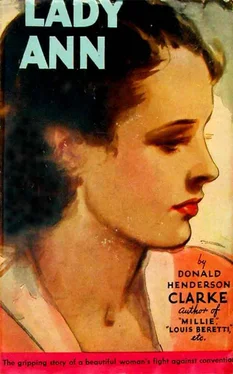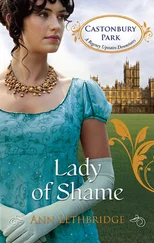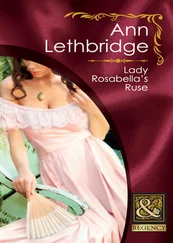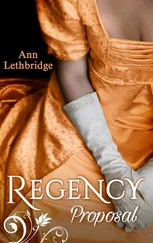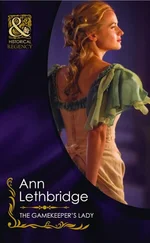Donald Henderson Clarke - Lady Ann
Здесь есть возможность читать онлайн «Donald Henderson Clarke - Lady Ann» — ознакомительный отрывок электронной книги совершенно бесплатно, а после прочтения отрывка купить полную версию. В некоторых случаях можно слушать аудио, скачать через торрент в формате fb2 и присутствует краткое содержание. Жанр: unrecognised, на английском языке. Описание произведения, (предисловие) а так же отзывы посетителей доступны на портале библиотеки ЛибКат.
- Название:Lady Ann
- Автор:
- Жанр:
- Год:неизвестен
- ISBN:нет данных
- Рейтинг книги:5 / 5. Голосов: 1
-
Избранное:Добавить в избранное
- Отзывы:
-
Ваша оценка:
- 100
- 1
- 2
- 3
- 4
- 5
Lady Ann: краткое содержание, описание и аннотация
Предлагаем к чтению аннотацию, описание, краткое содержание или предисловие (зависит от того, что написал сам автор книги «Lady Ann»). Если вы не нашли необходимую информацию о книге — напишите в комментариях, мы постараемся отыскать её.
Lady Ann — читать онлайн ознакомительный отрывок
Ниже представлен текст книги, разбитый по страницам. Система сохранения места последней прочитанной страницы, позволяет с удобством читать онлайн бесплатно книгу «Lady Ann», без необходимости каждый раз заново искать на чём Вы остановились. Поставьте закладку, и сможете в любой момент перейти на страницу, на которой закончили чтение.
Интервал:
Закладка:
Chapter One
Elihu Steele was a carpenter, and in his spare time farmed the ten acres on which was set his two-story, eight-room, white clapboard house in Elm Street, Eastham.
He was a big man, well over six feet in his stockings, wide-shouldered, a little stooped, with a big, bull voice. When he wanted chewing tobacco, he and his cousin, Albert Steele, lifted up one side of the red cow barn, pushed a keg of tobacco leaves, rum and molasses under the corner, and let the barn settle back into place. This procedure made nice, strong chewing material.
Elihu went to church every Sunday with his wife, Naomi, who had been a Smith of Old Orchard when he had married her twelve years before. The first Smith, Ebenezer, had come over on the Mayflower. The first Steele, Lieutenant Elihu, first had set foot on Massachusetts soil in 1630. The Steeles and the Smiths believed that kings and queens and aristocrats all were stupid, in-bred parasites suffering of syphilis, dementia praecox and curvature of the spine. They devoutly believed that the Smiths and the Steeles were the leading families, not only of Eastham and Massachusetts, but of the world.
They were members of the First Congregational Church of Eastham, where the Reverend Joshua Hazen in a voice like a trumpet call preached a jealous and fearful God, an earth exactly six thousand and some-odd years and hours old, and a blazing hell for infants and all others not baptized.
Elihu was not a deacon as had been the seven Elihus who preceded him, but he never went fishing in Fast River, or Broad Brook, or the Old Bed, or shooting at Moss’s Corners, or Old Haven, on Sunday.
On one such Sunday, having laid the foundation with a bath on Saturday night, he put on a suit of balbriggan underwear. Sitting on the edge of the inlaid walnut double bed with the crazy quilt cover, and grunting a little, he poked the toes of his right foot into the toe of a black sock, which he had turned inside out. He peeled this sock over the foot and up over the balbriggan leg of the drawers, swollen by a shapely and muscular calf.
Both socks on, he stepped into a pair of blue serge trousers, which he pulled up around his slightly bulging abdomen. Letting the suspenders hang for a moment, he opened the second drawer of the inlaid walnut bureau and took from it a white shirt with a stiff bosom. After inserting studs in the neckband, front and back, he pulled on the shirt over his head. Next, he selected a collar, and grunted, and turned red in the gills before he succeeded in snapping it into place over the studs. He stood in front of the mirror over the bureau and put a black tie under the white linen turn-down collar. Then, with the tie still hanging, he sat down again on the edge of the bed and pulled on Congress shoes, which were boots with elastic sides and no laces or buttons.
After that he arose, kicked a few inches first with one leg, and then with the other, to set himself comfortably in drawers and trousers, hitched the suspenders over his shoulders, and buttoned his fly. Stepping to the door he bellowed:
“Naomi.”
“Yes, Elihu,” Naomi replied from the dining room downstairs. “Coming.”
She was a short woman with large breasts and hips, tapering arms and legs, small wrists and ankles, and tiny hands and feet. Her cheeks were pink from work in the kitchen, where she had been pounding top round steak full of holes with a hammer and beating up batter for sour milk griddle cakes. Elihu liked to eat a dozen or so big griddle cakes soaked in steak gravy for breakfast on Sundays.
Naomi brushed damp brown curls from a white, damp forehead, wiped her hands on her gingham apron, stood on tiptoe, and took hold of the ends of the tie. Elihu raised his chin and stretched his neck, and breathed noisily while she made a bow and patted it into place. She said:
“There. How’s that?”
He put two hands, like steel hooks, under her armpits and hoisted her easily from the floor. As if it were an unusual occurrence, she squealed:
“Elihu, put me down. I’ve got to get the breakfast.”
He had black hair and brown eyes, a high arched nose, a wide mouth shaded by a yellow mustache, and a big chin. He rubbed her straight little nose with his big one, and pressed his lips to hers. He said:
“The breakfast can wait. Give me a kiss.”
She put plump arms around his neck and kissed him, her feet, in old but shapely high shoes, more than a foot from the rag rug which covered the patch of wide floor boards in front of the bed. Cheeks pink, and a little breathless, she drew back, blue eyes gazing into brown ones, and asked:
“What’s the matter with you all of a sudden, Elihu?”
He grinned, and pressed his mouth to her white neck. She wriggled, laughed, and cried:
“Oooh! That tickles.”
He dumped her on the mussed-up bed, so that she bounced. Brown hair came down in her eyes. She laughed and brushed it back. He took her by the ankles. She gasped, and cried agitatedly:
“Don’t, Elihu. Oh!”
He lifted her up by the ankles. Her skirts and petticoats fell over her head, revealing black lisle stockings, smooth white skin, and freshly ironed linen balloon drawers. He smacked her with his open palm on the balloon drawers. She kicked and squealed, and rolled away, breathless, panting, red-faced, as he smacked her again. She was between laughter and tears as she pulled up her clothing and bared white skin on which were red marks of fingers. She exclaimed reproachfully:
“Now I’ll be black and blue. You know how easy I bruise.”
“I’ll kiss it and make it well,” he said.
He sat down on the bed, which creaked under his weight, and kissed the fingerprints. Then he kissed her. She hugged him tight, sighed, and whispered:
“I love you, Elihu. I wonder if you love me as much as I do you.”
“You’re my little girl,” he said in what was intended to be a whisper but which was a low rumble.
After a minute, she said:
“You’re terrible, Elihu. Wait till I—”
But Elihu didn’t wait, and that is how it came about that two months later, in August, 1890, Dr. Samuel Benham said to Naomi:
“That’s right. You count nine months from the first day of your last period, and add ten days. But, of course, having February in there mixes it up some . . .”
Elihu carried Naomi up and downstairs. Naomi said:
“I don’t know why you act like this. I’m all right.”
“Sure, you are,” Elihu said. “But I like to do it.”
Naomi’s mother, Hetty, came from Old Orchard and took command of the house, the grounds, and as much of Elm Street as she could see through steel-bowed spectacles. Vina, an angular blonde girl, began to break dishes in the kitchen. Naomi said:
“This is ridiculous, Elihu. I feel just as well as I ever did. I like to do for myself.”
Elihu grinned and said:
“It’s kinda nice, isn’t it, to have Ma here?”
“I always loved to have Ma visit us,” Naomi said. “But this time she acts as if I was an invalid. You all do.”
Ma occupied the southeast chamber because she liked to see the sun as much as possible. The double bed in her room was rendered useless by a wooden frame over it on which she began to make a rag quilt, with tufts. She slept on a cot, but she said every morning:
“I scarcely slept a wink last night.”
She put her false teeth in a tumbler of water every night, and sucked horehound drops, and worked all day and into the night, when she darned Elihu’s socks and her own and Naomi’s stockings by the light of her kerosene lamp.
“It’s easier on the eyes,” she said of this old-fashioned illuminant.
She kept the three stone crocks in the pantry off the kitchen filled with ginger cookies, jumbles and doughnuts, and made apple pies at the rate of seven a week for Elihu. Ma said:
Читать дальшеИнтервал:
Закладка:
Похожие книги на «Lady Ann»
Представляем Вашему вниманию похожие книги на «Lady Ann» списком для выбора. Мы отобрали схожую по названию и смыслу литературу в надежде предоставить читателям больше вариантов отыскать новые, интересные, ещё непрочитанные произведения.
Обсуждение, отзывы о книге «Lady Ann» и просто собственные мнения читателей. Оставьте ваши комментарии, напишите, что Вы думаете о произведении, его смысле или главных героях. Укажите что конкретно понравилось, а что нет, и почему Вы так считаете.
